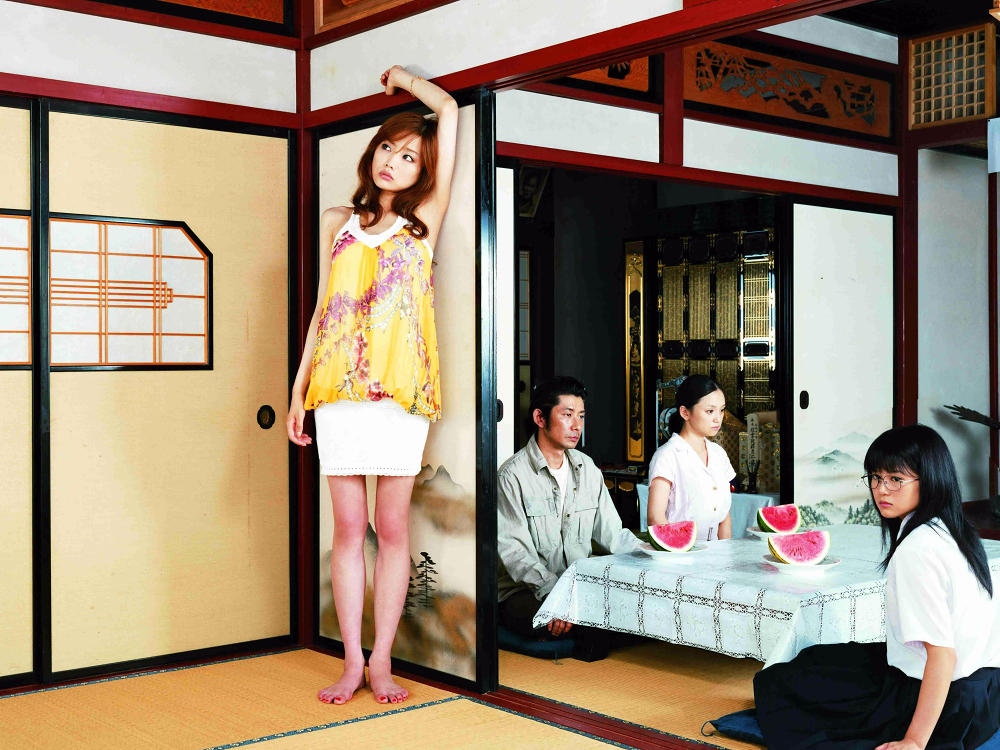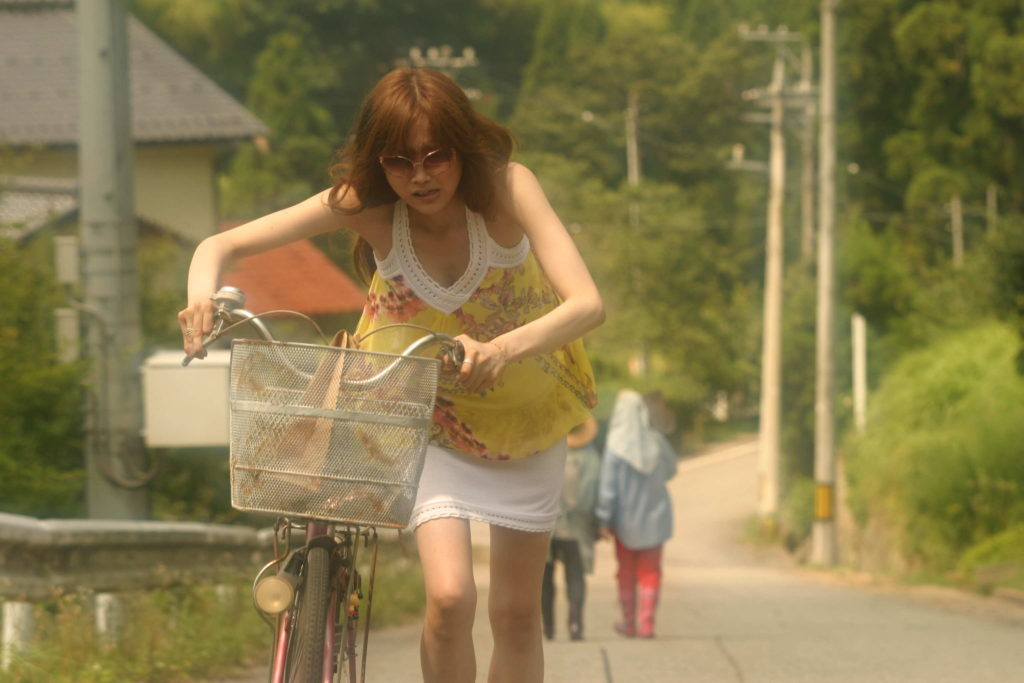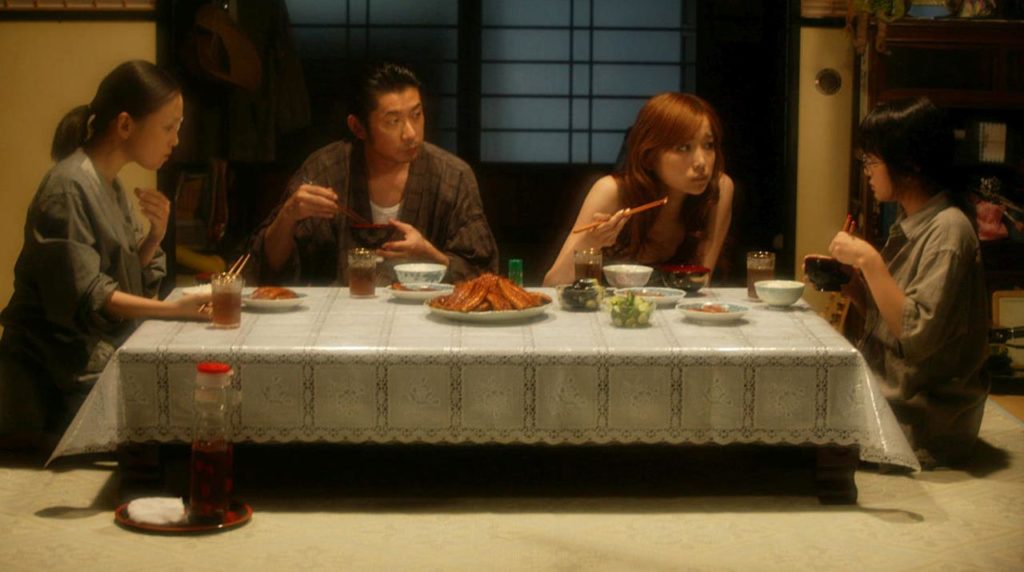Funuke, Show Some Love
November 5, 2021 · 0 comments
By Tom Wilmot.

The family drama is a staple of Japanese cinema and has been for many years. From the shōshimin-eiga (lower middle-class films) of the 1930s to the many masterpieces of Yasujiro Ozu, Japan has a proud lineage of reserved and moving melodramas. Funuke Show Some Love You Losers! is no such film. Based on the 2005 novel by author Yukiko Motoya, the film debuted in 2007 and earned first-time feature director Daihachi Yoshida plenty of praise. A family drama like no other, Yoshida’s somewhat forgotten work has been brought back into the fray through a new release from boutique Blu-ray label Third Window Films.
The Wago family children suffer a tragedy when their parents are killed in a cat-related road collision. Their sudden death means that, for the first time in years, aspiring actress and full-time narcissist Sumika (Eriko Sato) is visiting the family home. Her arrival is greeted by her step-brother Shinji (Masatoshi Nagase) and his sweet-yet-simple wife, Machiko (Hiromi Nagasaku). However, Sumika’s arrival spells trouble for her younger sister Kyomi (Aimi Satsukawa), as her sibling scolds her for a past betrayal.
It quickly becomes apparent that almost every remaining member of the Wago family is kind of awful, with Sumika taking the cake for being the most terrible of the offspring. A spoiled, dependent and utterly self-obsessed bimbo, Sumika struts around her late parents’ countryside home scrounging for cash, food, and any other favours she can wheedle out of the dejected Shinji. Her step-brother is hardly much better, as the miserable soul takes every opportunity to scold his loving wife Machiko when not neglecting her entirely. Even the meekly Kyomi struggles to contain a spitefulness that only becomes more prevalent as the story unfolds. The only truly likeable figure in the Wago home is Machiko, whose enduring optimism and pure-hearted nature puts her relatively newfound family to shame. You’ll do well not to find yourself infuriated at her constant mistreatment from nearly everyone in the village.

In a general sense, Japanese family dramas have a history of exploring the divide between generations, a theme which is arguably most well-represented in Ozu’s films of the post-war era. However, Yoshida does away with this narrative trope by killing off the heads of the Wago family straight away and instead choosing to focus on the relationships between the siblings. The established family dynamic is complicated, to say the least, yet it’s always presented in a believable fashion, no matter how bizarre it gets. The toxicity between Sumika and Kyomi is deeply uncomfortable, as is the unusual hold that the former has over a hapless Shinji. There’s little warmth to the Wago family, yet each member, despite their flaws, is made extremely watchable due to their quirky personality. The flamboyancy of the Wagos is akin to the exaggerated caricatures found in Sogo Ishii’s similarly unhinged household drama The Crazy Family (1984). However, whereas the carnage in that film borders on the farcical, the challenges faced by the estranged siblings in Funuke are a little closer to reality and, hence, cut a bit deeper.
The drama unfolds out in the sticks of Ishikawa prefecture, which is beautifully shot by cinematographer Shoichi Ato. The lush green fields and clear blue skies are idyllic to the point of looking artificial, something which is only accentuated through the highly saturated colour palette. The distinct aesthetics mean that the soothing countryside setting feels detached from reality, especially when narrative devices such as pathetic fallacy find their way into the film. This slightly surreal backdrop excuses most of the absurd scenarios that the Wagos find themselves in. To add to this heightened sense of reality further, Yoshida even uses Kyomi’s passion as a manga artist for one visually explosive sequence in which the frame transforms into a comic panel. Suffice to say that while Sumika might be bored with her small-town home, we at least get to see it presented in an eye-popping fashion.
Despite the bright and colourful imagery, Yoshida takes us to some dark places with Funuke. It’s hard to believe that a film with such a consistently light-hearted tone could touch prostitution, bullying, domestic abuse, suicide, and a whole lot more. These narrative aspects aren’t played off as a joke either, with many of the Wago family’s circumstances having dire consequences for the remaining members. However, there is an air of general silliness that means the film isn’t an overwhelming sombre affair. There’s sincerity present in the family issues tackled but also enough wit to keep things fun. It’s a tonal juggling act on the part of Yoshida, but one that the director handles near flawlessly. His approach means that in spite of some dark undertones, you can’t help but grin at the tongue in cheek absurdity on show in this laid-back tragi-comedy.

Third Window has supplemented the release of this distinctly charming family drama with several bonus features, including a quaint 25-minute making-of. The behind-the-scenes footage showcases the beauty of the Ishikawa countryside and shows us the trials and tribulations of the production. Along with the usual behind the camera antics, the footage also includes interviews with the main cast members. Interestingly, they all have different interpretations of the movie, each of which falls more in line with their character’s unique arc. Also included in this release is a handful of deleted scenes, along with full versions of Sumika’s appalling early acting work.
Few films can begin with a cat-induced family tragedy and still manage to make you smile, yet that is just what Funuke Show Some Love You Losers! manages to do. While far from being a typical Japanese family drama, the film still touches on many of the sentimental hallmarks that one would expect to find in the genre. In little under two hours, Daihachi Yoshida’s film took me on a jumbled rollercoaster of emotions with a story that goes from the infuriating to the hilarious in seconds. You may not come to love the selfish characters at the heart of the Wago family saga, but you certainly won’t be bored by their chaotic endeavours.
Funuke Show Some Love You Losers is released in the UK by Third Window.
Leave a Reply